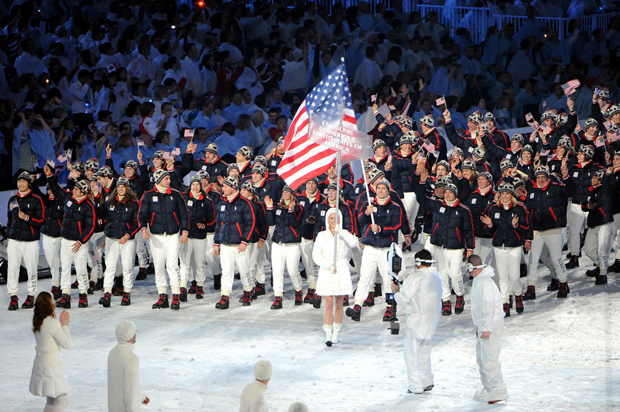5 Dramatic Reasons to Watch the 2018 Winter Olympics
Theater lovers will transform into sports fanatics this February.

(© Tim Hipps)
As an avid fan of the theater, you may think that the upcoming Olympic Games in Pyeongchang have nothing to offer you — but you would be wrong. Occurring biennially, the Olympics are perhaps the most theatrical international event on earth. The winter games especially raise the stakes by putting the thrill of victory and the agony of defeat on ice. Whether you're interested in conflict, spectacle, or human emotion, the Pyeongchang games have something very dramatic in store for you. Here are five reasons why you absolutely must tune in.
1. The Opening Ceremony
The most obvious Olympic hook for the dramatically inclined is the opening ceremony. This is when the athletes march into the stadium, but it is also a chance for the host country to show off. That was certainly the case four years ago when Russia presented its entire history during the Sochi opening ceremony. There was a ballet interpretation of War and Peace, a demonstration of Meyerholdian biomechanics, and a baby carriage parade — all to tell the story of Mother Russia's glorious past. It was likely the grandest example of fascist theater in our lifetimes, and perhaps the best opening ceremony as well. But those of us who recently took in KPOP know that South Korea is not to be underestimated in terms of showmanship. We predict an unforgettable opening ceremony in Pyeongchang on February 9, so mark your calendar.
2. Figure Skating
Anyone who has seen the soon-to-be Oscar-winning film I, Tonya understands the inherent theatricality of figure skating. Between the sequined costumes, the lyrical choreography, and the kiss-and-cry zone, this is the sport of true drama queens. This year, the American team will be led by comeback kid Mirai Nagasu (whose unjust exclusion from Sochi we've written about previously) and 18-year-old phenom Nathan Chen, the first skater ever to include five quadruple jumps in one routine. Chen might seem like a lock for the gold medal, but he faces stiff competition in the form of reigning gold medalist Yuzaru Hanyu of Japan, whose expressive routines have been known to bring audiences to tears. With 1998 gold medalist Tara Lipinski and the ever-theatrical Johnny Weir commenting for NBC, you know this is going to be must-see TV.
3. And Other Sports Too…
As nerve-racking as it is waiting for scores in the kiss-and-cry, it is nothing compared to hurtling headfirst at 80mph with just a tiny sled between you and the ice. That's what competitors in skeleton will be doing. There's also luge (which is faster and feet-first) and bobsled (essentially a racecar on ice). People have died in these sports, meaning the stakes of competition couldn't be higher. Prepare to spend your February frozen in suspense.
4. North and South Korea
As if the sports didn't offer enough of their own drama, this year's games will take place in close proximity to a war border. Although an armistice between North and South Korea was signed in 1953, a formal peace has never been declared. That means the two countries are still technically at war, a fact that manifests itself in chronically frosty relations, sporadic assassination attempts, and the occasional armed skirmish. Recent talks have given hope for a peaceful February, with the North planning to send a delegation of athletes to Pyeongchang. Athletes from both countries will march side by side in the opening ceremony and the North and South will even field a joint women's hockey team. This could be the moment that Korea takes a huge step toward unification. Of course, North Korean dictator Kim Jong-un possesses a flair for the dramatic, so it is anybody's guess if the good vibes will last.
5. Olympic Athletes From Russia
During previous opening ceremonies, you may have noticed a small contingent of independent athletes marching under the Olympic flag. Expect that group to be a lot more populated this year, specifically with Russians. That's because Team Russia has been banned from this year's competition in the wake of a massive doping scandal. Russian athletes who manage to pass their drug tests will be allowed to compete under the more neutral banner of "Olympic Athletes from Russia," but the International Olympic Committee has issued strict prohibitions against the Russian flag and national anthem. Still, expect high theatrics, clever workarounds, and alternative facts from triumphant Russians on the podium and in front of the press. This is already something of an Olympic tradition.








